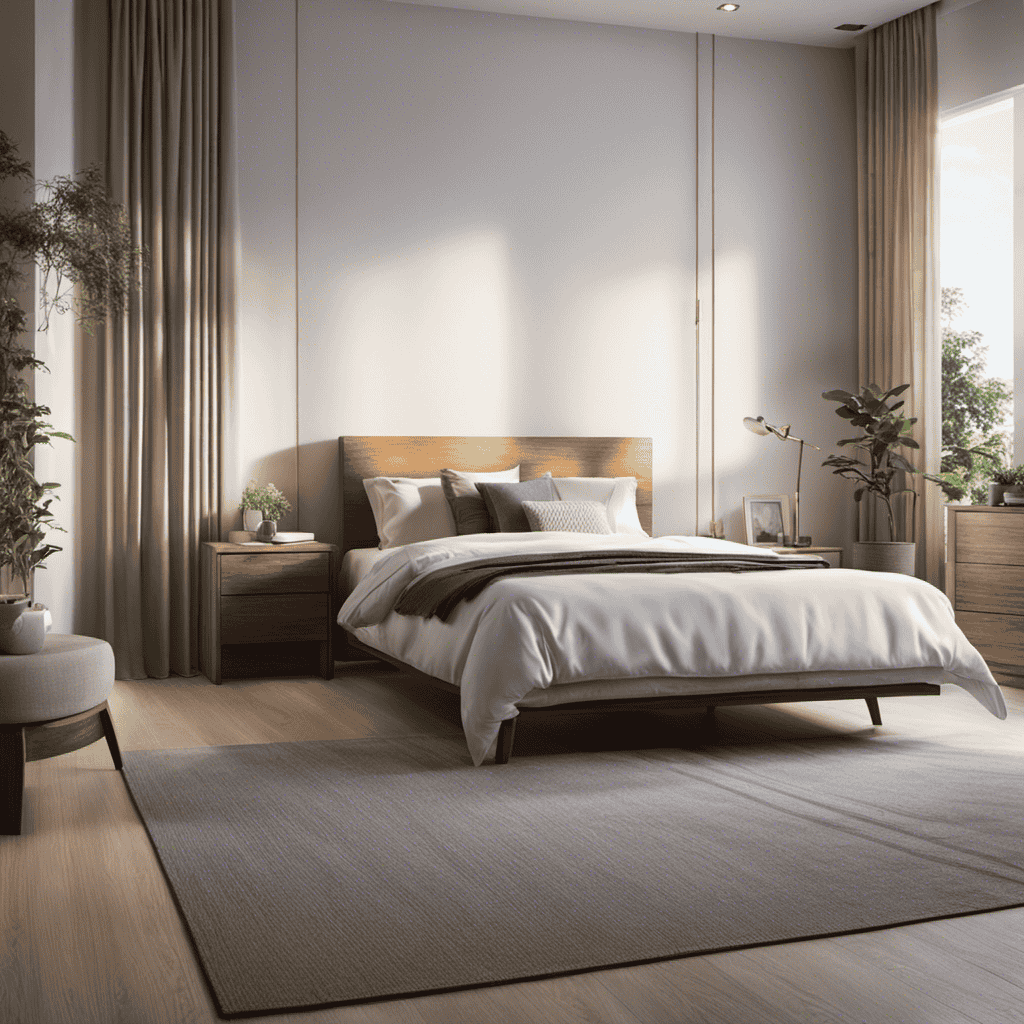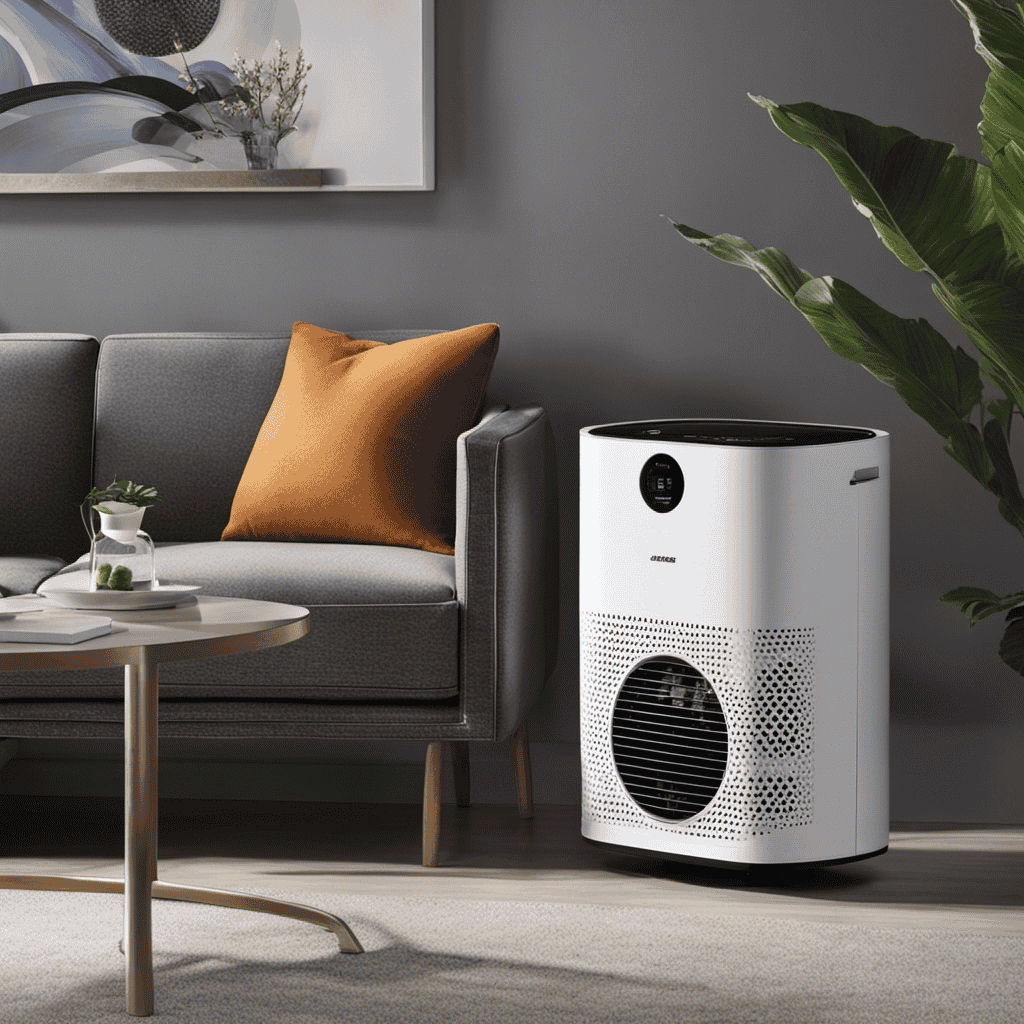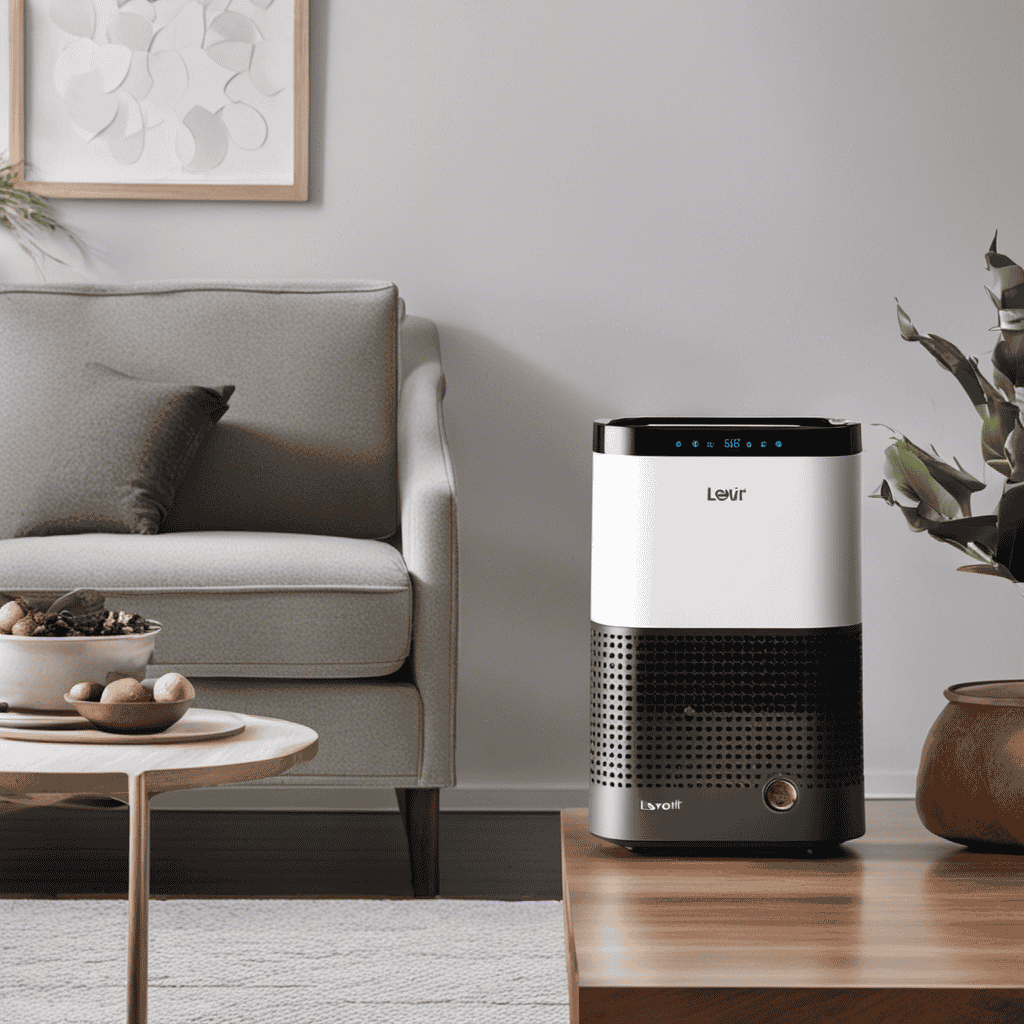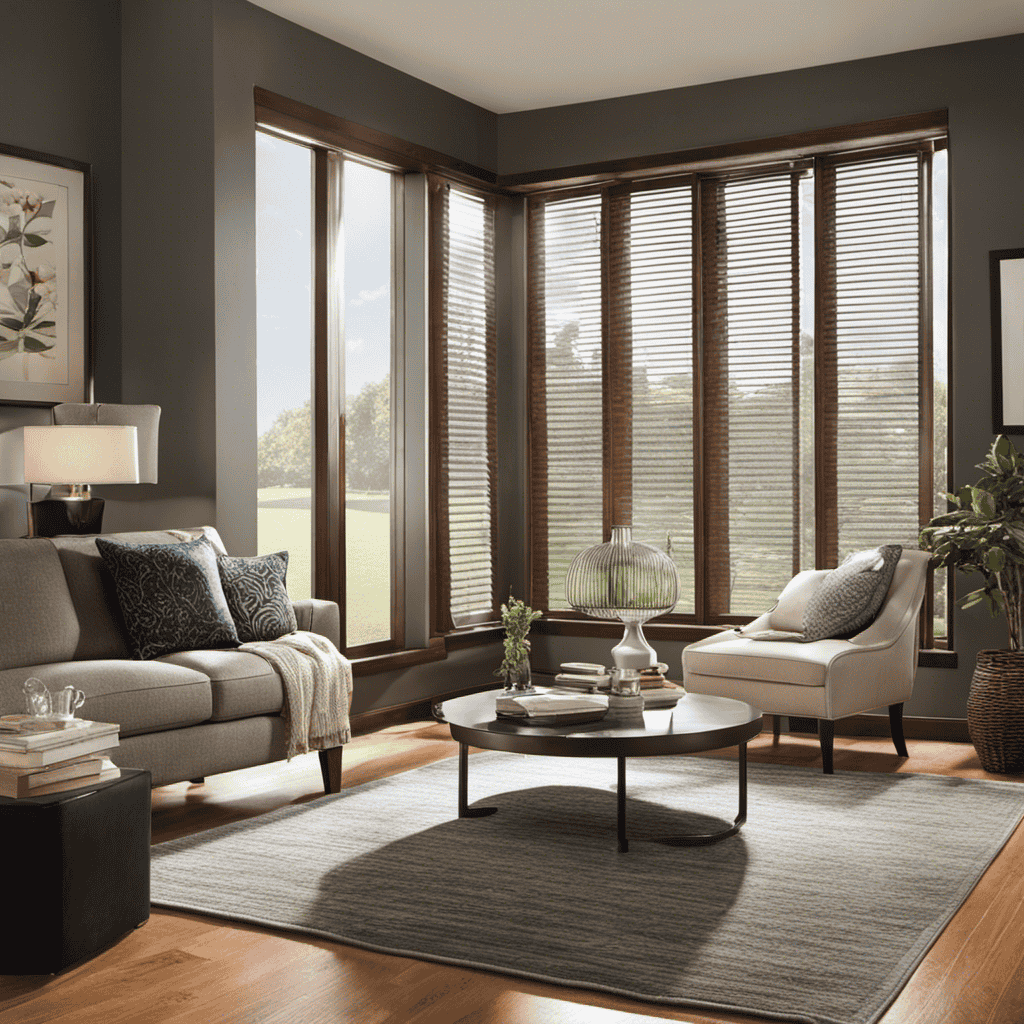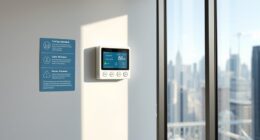Are you aware that the average individual typically spends approximately 90% of their time indoors? This constant exposure to indoor air pollutants can worsen specific health conditions.
In this article, I will explore the medical conditions that can benefit from using an air purifier. From asthma and allergies to respiratory infections and environmental sensitivities, there are numerous ailments that can be relieved by having clean and purified air in our homes.
Let’s dive in and discover which medical conditions require an air purifier.
Key Takeaways
- Air purifiers are beneficial for individuals with asthma and allergies as they can reduce triggers such as dust, pet dander, and mold spores.
- People with COPD and respiratory infections can benefit from air purifiers as they help remove harmful particles and chemicals present in cigarette smoke and other pollutants, improving breathing and reducing flare-ups.
- Air purifiers can also help manage COPD and bronchitis symptoms by improving indoor air quality and reducing irritants.
- In the context of COVID-19 prevention, practicing good hygiene, maintaining social distancing, and wearing masks are crucial, but air purifiers can also contribute to creating a cleaner and healthier breathing environment.
Asthma
If you have asthma, an air purifier can help reduce the triggers that may worsen your symptoms. Asthma is a chronic condition that affects the airways, causing inflammation and narrowing, which can lead to difficulty breathing, wheezing, and coughing.
Air pollution, both indoor and outdoor, can aggravate asthma symptoms. Indoor air quality is particularly important, as we spend a significant amount of time indoors. Common indoor air pollutants include dust, pet dander, mold spores, and volatile organic compounds (VOCs) from cleaning products or furniture.
An air purifier can help remove these particles and pollutants from the air, creating a cleaner and healthier environment for individuals with asthma. It filters the air, trapping allergens and irritants, and can provide relief by reducing exposure to triggers that can provoke asthma attacks.
Allergies
When it comes to allergies, two common triggers are pollen and dander sensitivity.
Pollen allergies can cause symptoms such as sneezing, itching, and nasal congestion.
Dander sensitivity refers to an allergic reaction to the tiny skin flakes of animals.
Understanding these triggers is important, especially for individuals with asthma.
Both pollen and dander can exacerbate asthma symptoms and lead to breathing difficulties.
Pollen and Dander Sensitivity
People with pollen and dander sensitivity may benefit from using an air purifier. An air purifier can help improve indoor air quality and reduce the presence of allergens in the environment. Here are three key benefits of using an air purifier for pollen and dander sensitivity:
-
Filters out pollen: Air purifiers with HEPA filters can effectively trap pollen particles, preventing them from circulating in the air and triggering allergies.
-
Removes dander: Air purifiers can also capture pet dander, which is a common allergen for many people. This can be particularly helpful for individuals with pet allergies.
-
Reduces symptoms: By reducing the amount of pollen and dander in the air, air purifiers can help alleviate symptoms such as sneezing, itchy eyes, and congestion.
Using an air purifier can provide relief for those with pollen and dander sensitivity, improving their overall indoor air quality.
Transitioning into the subsequent section about asthma triggers, it is important to note that air purifiers can also be beneficial for individuals with asthma by removing irritants that can trigger attacks.
Asthma Triggers
One of the triggers for asthma can be poor indoor air quality, which can be improved by using an air purifier. As someone who suffers from asthma, I understand the importance of having clean and purified air to breathe. Air purifiers have several benefits that can help alleviate asthma symptoms. They are designed to remove allergens, such as dust, pollen, and pet dander, from the air, reducing the risk of asthma attacks. Some air purifier features that are particularly beneficial for asthma sufferers include HEPA filters, which can capture even the smallest particles, as well as activated carbon filters, which can remove odors and chemicals. Additionally, air purifiers with adjustable fan speeds and timers allow for customization and convenience. Investing in a high-quality air purifier can greatly improve the air quality in your home and provide relief for asthma symptoms.
| Air Purifier Benefits | Air Purifier Features |
|---|---|
| Removes allergens | HEPA filters |
| Reduces asthma attacks | Activated carbon filters |
| Improves air quality | Adjustable fan speeds |
| Provides relief | Timer |
COPD (Chronic Obstructive Pulmonary Disease
COPD is a condition that can benefit from using an air purifier. As someone with COPD, I understand the importance of clean air in managing my symptoms and improving my overall quality of life. Here are three reasons why using an air purifier is beneficial for individuals with COPD:
-
Removes cigarette smoke: Cigarette smoke is a major trigger for COPD symptoms. An air purifier with a HEPA filter can effectively capture and eliminate the harmful particles and chemicals present in cigarette smoke, reducing the risk of exacerbating symptoms.
-
Filters out air pollution: Air pollution, including pollutants like dust, pollen, and smog, can worsen COPD symptoms. An air purifier can help remove these pollutants from the air, creating a cleaner and healthier environment for individuals with COPD.
-
Reduces respiratory irritants: Air purifiers can also help remove common respiratory irritants like pet dander, mold spores, and odors. By reducing exposure to these irritants, individuals with COPD may experience fewer flare-ups and enjoy improved breathing.
Respiratory Infections
When it comes to respiratory health, there are several key points to consider.
First, allergies and asthma can cause difficulty breathing and should be managed with proper medication and avoidance of triggers.
Second, COPD and bronchitis are chronic respiratory conditions that can be exacerbated by environmental factors such as air pollution.
Lastly, in light of the ongoing COVID-19 pandemic, it is crucial to practice preventive measures. This includes wearing masks, practicing good hand hygiene, and maintaining social distancing to reduce the risk of respiratory infections.
Allergies and Asthma
If you suffer from allergies or asthma, using an air purifier can help alleviate your symptoms. Here are three reasons why air purifiers are beneficial and effective for individuals with allergies and asthma:
-
Removes airborne allergens: Air purifiers are designed to capture and eliminate common allergens such as pollen, dust mites, pet dander, and mold spores. By reducing the presence of these triggers in the air, they can significantly improve indoor air quality and minimize allergy symptoms.
-
Filters out irritants: Air purifiers also remove irritants like smoke, odors, and volatile organic compounds (VOCs) from the air. These irritants can worsen asthma symptoms and trigger respiratory distress. By eliminating them, air purifiers create a cleaner and healthier breathing environment.
-
Promotes better sleep: Many allergies and asthma sufferers experience disrupted sleep due to symptoms like nasal congestion and coughing. Air purifiers can help improve sleep quality by reducing allergens and irritants, allowing for a more restful night’s sleep.
COPD and Bronchitis
To manage your symptoms and improve your respiratory health, it’s important to understand the link between COPD and bronchitis. COPD, or chronic obstructive pulmonary disease, is a long-term lung condition that includes chronic bronchitis and emphysema. Bronchitis, on the other hand, refers to the inflammation of the bronchial tubes, which carry air to and from the lungs. Both conditions can be caused or worsened by factors such as air pollution and smoking. In fact, smoking cessation is one of the most effective ways to prevent and manage COPD and bronchitis. By quitting smoking and reducing exposure to air pollution, individuals can significantly improve their respiratory health and reduce symptoms such as coughing, wheezing, and shortness of breath.
| COPD | Bronchitis |
|---|---|
| Chronic obstructive pulmonary disease | Inflammation of the bronchial tubes |
| Includes chronic bronchitis and emphysema | Can be caused by air pollution and smoking |
| Managed through smoking cessation and reducing exposure to air pollution | Symptoms include coughing, wheezing, and shortness of breath |
COVID-19 Prevention
You can protect yourself and others from COVID-19 by practicing good hygiene, such as washing your hands frequently and wearing a mask in public places. Here are three important things you can do to prevent the spread of the virus:
-
Practice proper hand hygiene: Wash your hands with soap and water for at least 20 seconds, especially after being in public places or touching surfaces. If soap and water are not available, use hand sanitizer with at least 60% alcohol.
-
Maintain social distancing: Keep a distance of at least 6 feet from others, especially if they are coughing, sneezing, or not wearing a mask. Avoid crowded places and large gatherings to minimize the risk of exposure.
-
Wear a mask: Cover your nose and mouth with a mask when you are in public settings where social distancing measures are difficult to maintain. This helps prevent the spread of respiratory droplets that may contain the virus.
By following these preventive measures, you can reduce the risk of contracting and spreading COVID-19.
Now, let’s move on to the next topic: sinusitis.
Sinusitis
Sinusitis can be relieved by using an air purifier. When I suffer from nasal congestion and sinus pressure, I find that using an air purifier helps to alleviate these symptoms.
An air purifier works by filtering out airborne particles such as dust, pollen, and pet dander, which can trigger sinusitis symptoms. By removing these irritants from the air, an air purifier can help reduce nasal congestion and relieve sinus pressure. It creates a cleaner and healthier environment, which can be especially beneficial for individuals with chronic sinusitis.
However, it is important to note that an air purifier is not a cure for sinusitis and should be used in conjunction with other treatments recommended by a healthcare professional.
Now, let’s move on to discuss another medical condition that can benefit from the use of an air purifier: bronchitis.
Bronchitis
Bronchitis can cause inflammation of the bronchial tubes, leading to coughing and difficulty breathing. It is a common respiratory condition that can be acute or chronic. When bronchitis becomes chronic, it means that the inflammation in the airways persists for a longer period, causing repeated episodes of coughing and breathing difficulties. This chronic inflammation can eventually lead to airway obstruction, making it harder for air to flow in and out of the lungs.
To manage bronchitis and reduce symptoms, there are several approaches that can be taken:
-
Taking prescribed medications, such as bronchodilators and anti-inflammatory drugs, to help open up the airways and reduce inflammation.
-
Avoiding triggers, such as smoking, air pollution, and respiratory infections, that can worsen symptoms and trigger flare-ups.
-
Using air purifiers in the home to improve indoor air quality and remove pollutants and irritants that can exacerbate bronchitis symptoms.
Pet Allergies
If you have pet allergies, it’s important to consider getting an air purifier to help improve indoor air quality and reduce the allergens that can trigger your symptoms.
Pet dander and pet hair are common allergens that can cause sneezing, itching, and even difficulty breathing in some individuals.
An air purifier works by filtering out these allergens from the air, trapping them in a filter and preventing them from circulating throughout your home.
It can help to remove not only pet dander and hair, but also other airborne irritants like dust mites, pollen, and mold spores.
Environmental Sensitivities
Environmental sensitivities can cause a range of symptoms, including headaches, fatigue, and skin irritation. Living with multiple chemical sensitivities can be challenging, as even low levels of certain chemicals can trigger adverse reactions.
Indoor air pollution is a major concern for individuals with environmental sensitivities, as it often contains a variety of harmful chemicals and pollutants. To address this issue, it is important to invest in an air purifier that can effectively filter out these contaminants.
Here are three reasons why an air purifier is essential for individuals with environmental sensitivities:
-
Reduces exposure to harmful chemicals: An air purifier can remove volatile organic compounds (VOCs) and other toxic substances from the air, minimizing the risk of triggering symptoms.
-
Improves air quality: By removing allergens, dust, and other pollutants, an air purifier creates a cleaner and healthier indoor environment, reducing the likelihood of symptoms.
-
Provides relief and comfort: Breathing clean air can alleviate symptoms such as headaches and fatigue, allowing individuals with environmental sensitivities to live more comfortably.
Investing in a high-quality air purifier is crucial for managing environmental sensitivities and reducing exposure to indoor air pollution.
Frequently Asked Questions
Can Using an Air Purifier Completely Cure My Asthma or Allergies?
Using an air purifier can help manage asthma and allergies by improving indoor air quality. However, it may not completely cure these conditions. Consult with a healthcare professional for personalized advice.
Are There Any Specific Air Purifier Models That Are More Effective in Reducing Respiratory Infections?
There are specific air purifier models that are more effective in reducing respiratory infections. Regular air purifier maintenance is important for optimal performance. Using air purifiers in the workplace has several benefits.
Can Air Purifiers Help Alleviate Symptoms of Bronchitis and Sinusitis?
Yes, air purifiers can help alleviate symptoms of bronchitis and sinusitis. They filter out airborne particles that can irritate the respiratory system. I use one for my allergies, and it’s made a big difference.
How Can Air Purifiers Help Individuals With Environmental Sensitivities?
Air purifiers can be beneficial for individuals with environmental sensitivities, as they help filter out harmful chemicals and allergens from the air. They can also provide relief for those with asthma by reducing triggers.
Are There Any Specific Features or Filters in Air Purifiers That Are Particularly Effective Against Pet Allergens?
There are certain features and filters in air purifiers that can be particularly effective against pet allergens. They help to remove pet dander and other allergens from the air, improving overall air quality.
Conclusion
In conclusion, air purifiers can be beneficial for individuals with various medical conditions such as asthma, allergies, COPD, respiratory infections, sinusitis, bronchitis, pet allergies, and environmental sensitivities.
With the ability to filter out harmful particles and allergens from the air, these devices can greatly improve indoor air quality and help alleviate symptoms. In fact, studies have shown that air purifiers can remove up to 99.97% of airborne particles as small as 0.3 microns, including dust, pollen, pet dander, and smoke.
Imagine breathing in clean, purified air that is virtually free from these irritants, providing relief and promoting better overall health.
